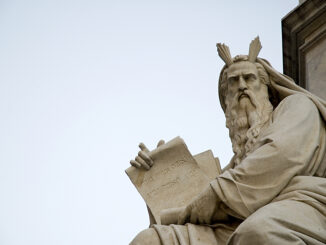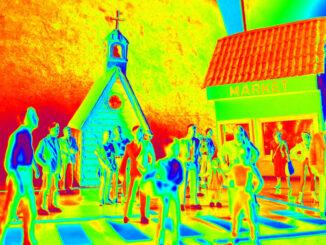
America’s founding principles are not merely tried—they are true.
<p class="has-drop-cap">In an important sense, there is nothing more quintessentially conservative than debating the meaning of conservatism. In his 1964 essay, “Notes Towards an Empirical Definition of Conservatism; Reluctantly and Apologetically Given,” William F. Buckley admitted that he had “never failed to dissatisfy an audience that asks the meaning of conservatism.” Richard Weaver’s consciously obtuse definition of conservatism—“a paradigm of essences toward which the phenomenology of the world is in continuing approximation”—was itself a tongue-in-cheek reference to the ultimate futility of defining the term. As an intellectual tradition, at least, the Right has always struggled to find a satisfactory description of itself: If conservatism is an “anti-ideology,” as some have argued—a politics that takes, as its first premise, what is rather than what could be—then it is tied to the contexts in which it appears, and is difficult, if not impossible, to fully elucidate in terms of abstract principle.</p>
This is a feature, not a bug, of the Right: A political project that seeks to conserve is often incoherent until the traditions, institutions and ways of life it defends are under threat. Since Edmund Burke’s fiery criticisms of the French Revolution, conservatism has tended to be formulated in response to progressive innovations. In a time of relative stability and civic harmony, the conservative sensibility often appears as a more implicit disposition, in which “men sail a boundless and bottomless sea; there is neither harbour for shelter nor floor for anchorage, neither starting-place nor appointed destination,” and “the enterprise is to keep afloat on an even keel,” as the British conservative philosopher Michael Oakeshott put it. It is only when the ship encounters a storm that the specific contours of “the Right,” in its material political context, can ever fully materialize.
But ours is not a time of domestic tranquility, and Oakeshott’s “conservative disposition”—“to prefer the familiar to the unknown, to prefer the tried to the untried, fact to mystery, the actual to the possible, the limited to the unbounded, the near to the distant, the sufficient to the superabundant, the convenient to the perfect, present laughter to utopian bliss”—while beautiful in its own right, is insufficient. The “ship,” as it were, does not just sail in stormy waters; its hull has sprung a leak, its captain is incapacitated, and half of its crew is rowing in the wrong direction. (The other half is on the verge of mutiny.) It is times like these in which conservatism becomes most coherent, taking on a fuller and more recognizable shape in response to the challenges to the civic order. In his latest book, Conservatism: A Rediscovery, Yoram Hazony has made as valiant an effort as any to provide its outline.
Up From Liberalism
Hazony, like Burke, defines conservatism in contrast to the more radical strain of rationalist liberalism that emerged in the Enlightenment—“a political tradition,” he writes, “descended from the principal texts of Enlightenment rationalist political philosophers such as Hobbes, Locke, Spinoza, Rousseau, and Kant.” But he also provides a positive vision of the conservative alternative, which he describes as “conservative”—rather than “liberal”—“democracy”: That alternative, he writes, “is closer to the spirit of the traditional constitution in both America and Britain than the liberal political theories of our day. And it is far better equipped to avert the complete collapse of political order and to maintain the free institutions of these nations.” Hazony’s thesis, then, can be understood as comprising two simple parts: First, what conservatives are against; and second, what conservatives are for.
What conservatism opposes, Hazony argues, is the rationalist liberalism that is “intended to imitate a mathematical system, which begins with axioms taken to be self-evident and proceeds by supposedly infallible deductions.” Those axioms include a confidence in man’s ability “to discover,” via the exercise of individual reason, “universal truths that hold good across all human societies and in every historical time frame”; the Lockean idea of “the free and equal individual,” which begins at the premise that “human individuals are by nature in a state of ‘perfect freedom’ and ‘perfect equality’”; and the subsequent belief, which flows from a politics premised on individual autonomy and consent, that “obligation arises from choice”—i.e., that “human individuals have no obligations to political institutions” that they do not consciously consent to. This is a politics that is at once utopian in its confidence in individual reason and skeptical in its view of permanent truths: For the rationalist, “there is no opinion, no habit, no belief” that is “so firmly rooted or so widely held that that he hesitates to question it and judge it by what he calls his ‘reason,’” Oakeshott wrote. But he “never doubts the power of his ‘reason’ (when properly applied) to determine the worth of a thing, the truth of an opinion, or the propriety of an action.”
Hazony sees this ideology everywhere today. “The axioms of the liberal-rationalist system,” he writes, “have dominated discourse wherever liberalism has advanced in Europe and America up until our own day.” If anything, that may be too optimistic an assessment: Increasingly, it is no longer Enlightenment rationalism, but a far more authoritarian “successor ideology”—the term coined by Wesley Yang to describe “the melange of academic radicalism now seeking hegemony throughout American institutions”—that now challenges the Western tradition. The radical uprisings on campus, the newfound hostility to free speech and debate in the nation’s cultural institutions, the return of explicit racial preferencing under the guise of “equity,” and the trading of individual excellence for equality of outcome are not liberal, at least in a way that would be recognizable to most of the liberal theorists that Hazony criticizes; what we face today is, in an important sense, illiberalism, a leftism self-consciously distinct from the left-liberalism of its predecessors.
That is not to say that the ideology Hazony describes is not to blame for much of our present discontent. Liberalism, at least in its rationalist, value-neutral form, is an inherently unstable arrangement. It inevitably gives way to something beyond what it alone can supply: The naked public square contains no built-in defense mechanism against those who would clothe it with the garment of their choosing. The great folly of the contemporary conservative movement’s embrace of value-neutral “classical liberalism” is that it cedes the values debate before it even begins.
Public orthodoxy is an inescapable fact of political life—the question is not if we should have an orthodoxy, but which—or rather, whose—orthodoxy we abide by. “The proposition that all opinions are equally—and hence infinitely—valuable,” as Willmoore Kendall put it, always and everywhere leads to the conclusion that “all opinions are equally—and hence infinitely—without value, so what difference does it make if one, particularly one not our own, gets suppressed?” In this sense, the fierce moralism of today’s young campus radicals is the logical conclusion of the relativist “live and let live” liberalism that preceded it.
Rationalist liberalism, then, may be the root of the problem, but it does not define the problem’s contemporary ethos. Hazony acknowledges as much when he writes that “a political regime founded on Enlightenment liberalism cannot sustain itself for even three generations. Enlightenment liberalism initiates a perpetual revolution that destroys its own foundations in the name of reason, opening the door to Marxism and fascism.”
What Is To Be Done?
Our moment cries out for something beyond and above rationalist liberalism. The Left’s answer is the successor ideology. For the Right, Hazony argues, the way forward lies in the rich resources of the Anglo-American conservative tradition, “whose classical period begins with John Fortescue and continues with individuals such as Richard Hooker, Sir Edward Coke, John Selden, Edward Hyde (Earl of Clarendon), Sir Matthew Hale, Sir William Blackstone, Josiah Tucker, Edmund Burke, George Washington, John Jay, John Adams, Gouverneur Morris, and Alexander Hamilton.”
This tradition of thought takes as its starting point five principles: A “historical empiricism” that roots the authority of our governing institutions in “constitutional traditions known, through the long historical experience of a given nation, to offer stability, well-being, and freedom,” and “entails a degree of skepticism regarding the divine right of the rulers, the universal rights of man, and all other abstract, universal systems”; a nationalism that emphasizes “bonds of mutual loyalty and unique inherited traditions” and “a conception of the nation as arising out of diverse tribes, its unity anchored in a common traditional language, law, and religion”; an affirmation of religion that “upholds and honors God and the Bible, the congregation and the family, and the religious practices common to the nation” as “essential to the national heritage and indispensable for justice and public morals”; limitations on executive power imposed “by the traditional laws of the nation, which the chief executive neither determines nor adjudicates,” as well as “the representatives of the people, whose advice and consent” the executive “must obtain respecting the laws, taxation, and other crucial matters”; and a recognition that individual freedom, understood as “the security of the individual’s life and property” and the “freedom of speech and debate,” is “the basis for a society that is both peaceful and prosperous, and is to be protected against arbitrary actions of the state.”
These are concrete starting-points. But they are not, I would argue, as much of a departure from “liberalism” as Hazony makes them out to be; the Anglo-American conservatism that Hazony describes is itself a part of a broader, richer “liberal” tradition that it has always been in conversation with. (Burke, as conservatives from Russell Kirk to Yuval Levin have argued, was a kind of “conservative liberal”; in his 1777 “Letter to the Sheriffs of Bristol,” Burke lauded “the liberal government of this free nation”; in Reflections on the Revolution in France, he assailed the French Jacobins on the basis that “their liberty is not liberal,” but belonged to “a vile illiberal school”). Liberal education, one of the greatest achievements of the West, is “liberal” in the traditional sense of the word—it does not offer “liberation from demanding moral ideals and social norms,” in the words of Robert George, but a “liberation from slavery to self.”
The problem, it seems to me, is that the premises and axioms of the progressive or rationalist liberalism have all but replaced the older form of conservative liberalism, exercising a monopoly over the terms of debate, even within the minds of many of those who would consider themselves to be “conservative.” The task for the conservative reformer is not to be anything other than liberal, but to be something more than a liberal, in the contemporary, value-neutral definition of the term.
This is a more daunting task than the one that conservatives of a previous era faced, given the degraded state of the traditions and moral resources that grounded and moderated their liberalism: As Hazony writes, “Both in Europe and in America, the principles of liberalism have not brought a greater honor for God and Scripture, national cohesion, and the flourishing of the family and the congregation—but the opposite. Everywhere it has gone, the liberal system has brought about the dissolution of these traditional institutions.” To be more than a liberal may well require something beyond the essentially liberal affirmation of constitutional traditions and freedoms that Hazony describes; conservatives should not reject them, of course, but they must recognize that tradition alone is no longer enough for renewal.
A restoration—and that is, ultimately, what we are describing—must begin at first principles. “Historical empiricism” may do the trick in a moment where the “constitutional traditions known, through the long historical experience of a given nation, to offer stability, well-being, and freedom” are robust and healthy. But today, tradition is not enough; amid the degraded state of our politics, we must build anew. A conservative counter-reformation takes, as its starting point, the traditions of the past—drawing on the full resources of the Western heritage, including the wisdom of the older liberal tradition—but it must rebuild those traditions first. That is not a passive posture, but an active one. It requires an energetic affirmation of certain abstract principles, including some that could be described as “liberal”—an appeal to a universal law, predicated on a confidence that, as Alexander Hamilton wrote in 1775, “the sacred rights of mankind are not to be rummaged for among old parchments or musty records,” but “are written, as with a sunbeam, in the whole volume of human nature, by the Hand of Divinity itself, and can never be erased or obscured by mortal power.”
In our skeptical age, conservatives need more than appeals to historical experience. Why, for example, is the Constitution a “glorious liberty document,” in the description of Frederick Douglass? To say that it is simply because it has stood the test of time rings hollow to many modern ears. We must be capable of explaining why it is good—why the way of life it secures, and the principles it reflects, are noble, and preferable to the alternative on offer from those who would discard them. For the fathers of the republic, as Douglass aptly put it, “nothing was ‘settled’ that was not right.” It was their “sublime faith in the great principles of justice and freedom” that “lay deep the corner-stone of the national super-structure.” America’s fate will be determined by our ability to reclaim that “sublime faith”—a faith that lies in the past, yes, but also one that sits beyond any historical context or experience. Our nation hungers for truth—concrete, affirmative truth, not buried under the “old parchments or musty records” of history. The Left offers a powerful moral vision and sense of purpose. The Right must answer in kind.
Apareció primero en Leer en American Mind






Be the first to comment